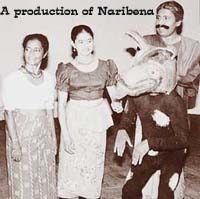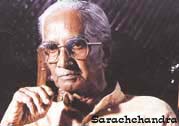

![]()
Musician Lionel Algama is best remembered for his pioneering effort in composing music for Dayananda Gunawardena's extremely popular drama, Nari Bena.
Appearing in the programme 'Shanta Me Re Yame' he related how he based the entire score on 'raban pada' which ultimately turned out to be a huge success.
To demonstrate, he sang 'Kumatada Sobaniye Kandulu Salanne', the top hit in Nari Bena, a number, most of us still sing after nearly four decades.
In the early '60s Dayananda and Lionel were on the staff of Thurstan College and when it came to the term end concert, Dayananda came up with the idea of presenting a popular folk tale as a stylised drama.
Lionel found it an exciting project. Both thought 'raban pada' would be ideal for the score.
They looked for advice and found an 'expert', Ruvitan Akka from Udugampola,
Dayananda's birth place. The tunes collected from her were adapted to suit
the drama.
'Nari Bena' was first staged in November 1961 as a school play and
a few months later Dayananda formed his own theatre group, Adhunika
Natya Sangamaya and presented the play with Salaman Fonseka playing
the key role of the fox and Sriyani Weerakooon (now Amarasena) as the daughter
of the gamarala.
"If Maname and Sinhabahu have proved capacities of the new musical drama as a medium for the expression of tragic experiences, Nari Bena shows its possibilities as a vehicle for vigorous and robust comedy", commented Reggie Siriwardena.
Several personalities from the literary and arts
scene are among the "50 Greatest Sri Lankans since Independence"
named by LMD (Lanka Monthly Digest), the popular business magazine. The
list has been compiled in conjunction with nominations by regular contributors
to the magazine.
"Refreshingly perhaps, a playwright, Dr Ediriweera Sarachchandra enjoyed
the highest number of nominations, closely followed by a politician and
two sportsmen - D S Senanayake, Duncan White and Sanath Jayasuriya,"
says the LMD Editorial.
Dr. Martin Wickremasinghe and Michael Ondaatje were the 'greatest' amongst a distinguished list of writers, Lester James Pieris was the leading 'cinematic' in Sri Lanka and Professor Senarath Paranavithana received the most nominations amongst eminent Sri Lankan professionals. Pioneering newspapermen D. R. Wijewardene & Tarzie Vittachi, distinguished painter George Keyt, the country's best known architect Geoffrey Bawa, 'Nightingale of Sri Lanka' Rukmani Devi and pioneers of the Sinhala ballet Chitrasena & Vajira are the other prominent personalities from the cultural and related fields.
How Sri Lankan patriots who were well versed in Sinhala language and literature did the groundwork in the struggle for freedom, formed the theme of an interesting and lively discussion televised over ITN on Independence day prior to the coverage of the official ceremony at Sri Jayawardenepura.
Leading the discussion was Tissa Abeysekera, the well-known writer and film director. Participating in it were Professors Mendis Rohanadheera and Tissa Kariyawasam, and lyric writer Sunil Sarath Perera.
The role played by pioneers like novelist Piyadasa Sirisena, writer Munidasa Kumaratunga, dramatist John de Silva, poets: Rev. S. Mahinda, Ananda Rajakaruna and Boralesgamuwe G. H. Perera was evaluated by the panel highlighting how their thoughts were conveyed to the masses in a most convincing manner. Professor Rohanadheera recited many a verse to illustrate his arguments.
The discussion was one of the best commemorative programmes broadcast to mark the Golden Jubilee of Independence.
In the fifties and sixties, the Peradeniya campus was totally different to what it is today. All the students were in residence and halls were not over-crowded. Ragging was very much a part of campus life, accepted and enjoyed by freshers and seniors alike.
In 'Mal Mawatha', P M Jayathilake relates his campus experiences in the first year. He has written his three year stint in three novels. The final part, in fact, was the first to be released under the title 'Hantane Geetaya'. The second part has been titled 'Bamara Sara'.
'Mal Mawatha' - a Dayawansa Jayakody publication - is a book not to be missed by anyone who had spent his/her university days in Peradeniya. It brings back memories of the days when it was a pleasure to be there. Jayathilake vividly describes how the raw undergrad gradually builds up friendships, begins to understand fellow students, gets used to a routine campus life and gradually becomes a mature young man.
The book is easy reading. The campus language is very much evident giving the reader a taste of the undergrad's vocabulary. He has tried to be as authentic as possible in the events and episodes he relates. As an 'old boy' of Peradeniya having been among the first batch of freshers (1953), I thoroughly enjoyed the book. The campus songs quoted in it made me go back to the many trips we did and the lively gatherings we had.
Jayathilake is a prolific writer. He has so far written ten novels, three poetry books, six dramas, a short story collection and two books on literary criticism (one of which is in English). Being a lawyer he has also written three books in law in English. A collection of short stories in English (The Pious) is in print.
Return to the Plus contents page
![]()
| HOME PAGE | FRONT PAGE | EDITORIAL/OPINION | NEWS / COMMENT | BUSINESS
Please send your comments and suggestions on this web site to
info@suntimes.is.lk or to
webmaster@infolabs.is.lk